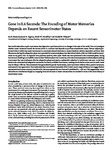Gone in 0.6 seconds: the encoding of motor memories depends on recent sensorimotor states.
| dc.contributor.author | Howard, Ian | |
| dc.contributor.author | Ingram, JN | |
| dc.contributor.author | Franklin, DW | |
| dc.contributor.author | Wolpert, DM | |
| dc.date.accessioned | 2019-10-22T12:36:58Z | |
| dc.date.available | 2019-10-22T12:36:58Z | |
| dc.date.issued | 2012-09-12 | |
| dc.identifier.issn | 0270-6474 | |
| dc.identifier.issn | 1529-2401 | |
| dc.identifier.uri | http://hdl.handle.net/10026.1/15024 | |
| dc.description.abstract |
Real-world tasks often require movements that depend on a previous action or on changes in the state of the world. Here we investigate whether motor memories encode the current action in a manner that depends on previous sensorimotor states. Human subjects performed trials in which they made movements in a randomly selected clockwise or counterclockwise velocity-dependent curl force field. Movements during this adaptation phase were preceded by a contextual phase that determined which of the two fields would be experienced on any given trial. As expected from previous research, when static visual cues were presented in the contextual phase, strong interference (resulting in an inability to learn either field) was observed. In contrast, when the contextual phase involved subjects making a movement that was continuous with the adaptation-phase movement, a substantial reduction in interference was seen. As the time between the contextual and adaptation movement increased, so did the interference, reaching a level similar to that seen for static visual cues for delays >600 ms. This contextual effect generalized to purely visual motion, active movement without vision, passive movement, and isometric force generation. Our results show that sensorimotor states that differ in their recent temporal history can engage distinct representations in motor memory, but this effect decays progressively over time and is abolished by ∼600 ms. This suggests that motor memories are encoded not simply as a mapping from current state to motor command but are encoded in terms of the recent history of sensorimotor states. | |
| dc.format.extent | 12756-12768 | |
| dc.format.medium | ||
| dc.language | eng | |
| dc.language.iso | eng | |
| dc.publisher | Society for Neuroscience | |
| dc.subject | Cues | |
| dc.subject | Feedback, Sensory | |
| dc.subject | Female | |
| dc.subject | Humans | |
| dc.subject | Male | |
| dc.subject | Memory, Short-Term | |
| dc.subject | Movement | |
| dc.subject | Psychomotor Performance | |
| dc.subject | Reaction Time | |
| dc.subject | Visual Perception | |
| dc.subject | Young Adult | |
| dc.title | Gone in 0.6 seconds: the encoding of motor memories depends on recent sensorimotor states. | |
| dc.type | journal-article | |
| dc.type | Article | |
| plymouth.author-url | http://www.ncbi.nlm.nih.gov/pubmed/22972999 | |
| plymouth.issue | 37 | |
| plymouth.volume | 32 | |
| plymouth.publication-status | Published | |
| plymouth.journal | J Neurosci | |
| dc.identifier.doi | 10.1523/JNEUROSCI.5909-11.2012 | |
| plymouth.organisational-group | /Plymouth | |
| plymouth.organisational-group | /Plymouth/Faculty of Science and Engineering | |
| plymouth.organisational-group | /Plymouth/Faculty of Science and Engineering/School of Engineering, Computing and Mathematics | |
| plymouth.organisational-group | /Plymouth/REF 2021 Researchers by UoA | |
| plymouth.organisational-group | /Plymouth/REF 2021 Researchers by UoA/UoA11 Computer Science and Informatics | |
| plymouth.organisational-group | /Plymouth/Users by role | |
| plymouth.organisational-group | /Plymouth/Users by role/Academics | |
| dc.publisher.place | United States | |
| dc.identifier.eissn | 1529-2401 | |
| dc.rights.embargoperiod | Not known | |
| rioxxterms.versionofrecord | 10.1523/JNEUROSCI.5909-11.2012 | |
| rioxxterms.licenseref.uri | http://www.rioxx.net/licenses/all-rights-reserved | |
| rioxxterms.type | Journal Article/Review |


